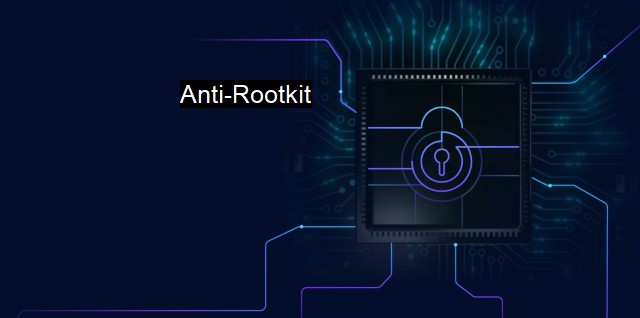What is Anti-Rootkit?
The Importance of Anti-Rootkit Technology in Cybersecurity Solutions
Anti-rootkit is a critical tool where battles against unauthorized access and harmful data breaches are a constant reality. The most basic understanding of an anti-rootkit is that it represents an advanced software solution specifically developed to detect and remove rootkits from computing systems. To truly comprehend the concept and importance of anti-rootkit, it is first essential to understand what a rootkit is in the context of cybersecurity.Fundamentally, a rootkit is malicious, often stealthy software designed by cybercriminals to gain unauthorized access to and manipulation of a computer, a server, or an entire network. The term 'rootkit' comes from 'root', a Unix/Linux term that is equivalent to being an 'Administrator' on Windows, and entails having unrestricted access and the highest privileges on any given computer system, and 'kit', which denotes a collection of tools or software programs. Rootkits are dangerous because, once accepted into a network, they can provide a perpetrator with remote command and control over the system with alarming stealth and sophistication. The breaching party can then exploit this access to execute illicit activities, such as data stealing, hardware damage, spread harmful codes, or establish further attacks.
Anti-rootkit software, therefore, is akin to a comprehensive security guard specifically tailored to combat these cleverly developed malicious pieces, identifying rootkits that are otherwise meticulously designed to remain undetected by regular antivirus products. As such, anti-rootkit software become key elements in cybersecurity strategies. Often incorporated as part of a holistic antivirus package, they are predominantly known for extreme precision, resilience, comprehensive system scans, and the ability to rid systems of potent threats.
Recognizing its critical role, it's pivotal to understand how anti-rootkit software operates. Notably, anti-rootkit detects and deals with rootkits using a myriad of methods. One common method is called "signature scanning", entailing comparison of files and system assets against known rootkit occurrences. Alternatively, a "behavioral-based" approach is used, where software checks specific actions for suspicious behavior symptomatic of rootkit presence.
Another method incorporated by anti-rootkit tools is the 'cross-view based' approach. Often touted as the most effective way to detect rootkit presence, it involves two-fold checks- assessing outputs from lower-level system scans and from higher-level API (Application Programming Interface) calls, then analyzing the results for contradictions that could indicate challenges to system integrity.
Anti-rootkit also integrates 'Time-based evasion techniques' into its operations. rootkits can interfere with system calls or elude detection during host activity; hence thorough scans during both working and inactive conditions are vital to catch malicious codes. Other intricate strategies like direct hardware and memory scanning, utilization of specific 'removal routines' for infection clearance, and zeroing on 'persistent rootkits' are also employed by these robust anti-rootkit packages.
While having anti-rootkit software bolsters cybersecurity, it’s crucial to maintain them properly because rootkit creators consistently evolve their techniques, making them harder to detect and eradicate. Regularly updating these security tools ensures they are equipped with the latest resource databases to combat new rootkit offshoots. Leveraging specialized anti-rootkit capabilities within broader antivirus software safeguards a network's vulnerabilities while delivering exegetic threat detection against menacing malware pieces.
Rootkits are an innovative and damaging approach taken by cyber perpetrators to hack into systems and perpetuate harm. The obscurity and complexity with which they operate necessitate an augmenting push for comprehensive defensive mechanisms. The anti-rootkit software, in this case, unfolds as the detective and exterminator versed in this covert language a rootkit talks, becoming the frontline defense against cyber intrusion. Thus, in cybersecurity and antivirus contexts, migrating beyond traditional defenses to specialized tools like anti-rootkit software is paramount to maintain the sanctity and safety of the digital world.

Anti-Rootkit FAQs
What is an anti-rootkit?
An anti-rootkit is a type of software that is designed to prevent, detect, and remove rootkits from a computer system. Rootkits are malicious programs that can hide deep within a system and allow an attacker to remotely control a machine.How does an anti-rootkit work?
An anti-rootkit works by scanning a computer system for any signs of rootkit activity. This can include looking for hidden files, processes, and registry entries. Once a rootkit is detected, the anti-rootkit software can then attempt to remove it from the system. In some cases, this may require a system reboot to fully remove the rootkit.Do I need an anti-rootkit if I already have antivirus software?
While antivirus software is designed to protect against a wide range of threats, including malware and viruses, they may not always be able to detect rootkits. This is because rootkits are specifically designed to hide from traditional antivirus software. Therefore, it is recommended to use an anti-rootkit in addition to antivirus software to ensure comprehensive protection against cybersecurity threats.Can anti-rootkit software cause issues with my computer?
In some rare cases, anti-rootkit software may cause issues with a computer system. This can occur if the software identifies legitimate files or processes as being malicious and attempts to remove them. However, most anti-rootkit software is designed to carefully analyze system files and will not remove anything unless it is certain that it is a rootkit. It is important to only download and use reputable anti-rootkit software to minimize any potential issues.| | A | | | B | | | C | | | D | | | E | | | F | | | G | | | H | | | I | | | J | | | K | | | L | | | M | |
| | N | | | O | | | P | | | Q | | | R | | | S | | | T | | | U | | | V | | | W | | | X | | | Y | | | Z | |
| | 1 | | | 2 | | | 3 | | | 4 | | | 7 | | | 8 | | |||||||